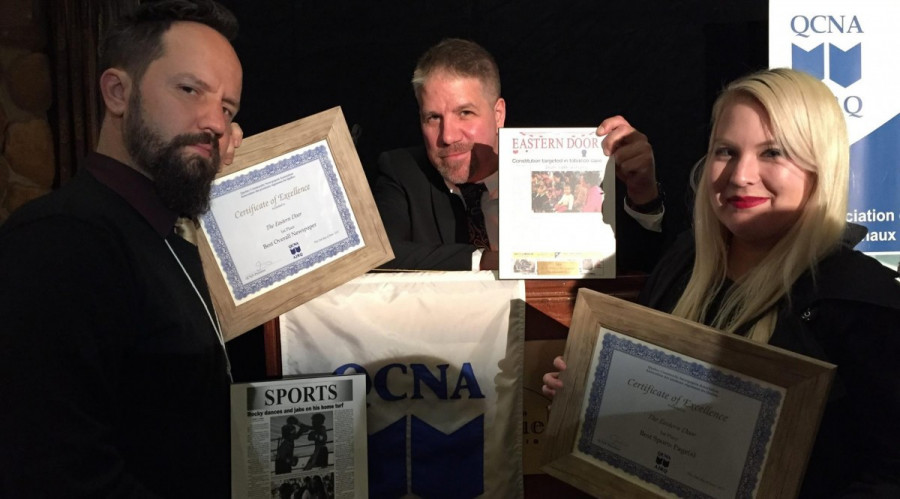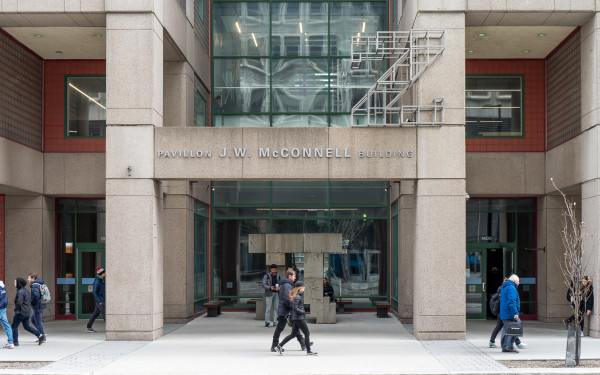Steve Bonspiel Named Concordia’s 2018 Journalist-in-Residence
Editor-in-Chief of the Eastern Door to Lead Community-Based Project
The Editor-in-Chief of the Kahnawake-based community newspaper The Eastern Door, Steve Bonspiel, has been selected to be Concordia’s Journalist-in-Residence for the Winter 2018 semester.
Like Concordia’s last Journalist-in-Residence, the New York Times’ Patti Sonntag, Bonspiel will be leading a group of students in a course throughout the semester. He’s said that he’s unsure of the shape the course will take, but that this is a good thing.
“The best part about a project like this is that we don’t even know. I don’t have it fully outlined because that’s the way it’s supposed to be,” said Bonspiel. “As a journalist, when you start an investigative story, you don’t know the whole story.”
He said that the goal of the course will be to introduce students to the community of Kahnawake and dispel myths about Indigenous people and life on reservations that are widely circulated in mainstream media.
“My approach, and it’s always been that, […] was to build bridges and bring people into our community and show them, ‘Hey look, this is a community just like any other’, and if you approach it that way, you’ll be fine,” he explained.
Bonspiel, a 2010 Michener Award finalist, has a longstanding relationship with Concordia University. Over the years, he explained, many undergraduate and diploma journalism students have taken on internships at The Eastern Door, which he bought in 2008. The Michener Awards serve to “honour and celebrate outstanding and unbiased public service in journalism,” their website explains.
The paper also won the Canadian Community Newspapers Association awards’ General Excellence category in April, by winning the Best Front Page, Best Editorial Page, and Best Overall Newspaper awards.
He said he believes that this pre-existing relationship with Concordia is part of the reason why he was chosen as the upcoming Journalist-in-Residence.
He also mused that the decision to bring in an Indigenous reporter was the Department of Journalism acting on the recommendations from the Truth and Reconciliation Commission, “to fix, so to speak, things, between Indigenous peoples and the mainstream.”
The report from that commission, published in 2015, listed 94 calls-to-action, one of which asked media schools to incorporate Indigenous history into their curriculums.
Department chair Dave Secko said they’ve been working on ways to include Indigenous reporting into the department’s curriculum for two to three years and bringing Bonspiel in as a Journalist-in-Residence accomplishes several of the department’s goals.
“In my own mind, not only is Indigenous [reporting] one of the factors we’ve been talking a lot about, thinking about that coverage, local journalism is a big thing the faculty’s talking about going forward,” explained Secko.
Last year’s project, helmed by Sonntag and funded by a Michener fellowship, was a national investigation deemed to be the first of its kind. Sonntag and a group of eight Concordia students teamed up with the Toronto Star, the National Observer, Global News, journalism schools from Ryerson University, University of British Columbia, and University of Regina, and the Corporate Mapping Project to conduct an investigation into southeast Saskatchewan’s oil industry and the refineries in Sarnia, Ont.’s Chemical Valley. After the release of the investigation into Chemical Valley, the Ontario Ministry of Environment has said it is committed to funding an air pollution study to examine health risks.
Due to the national scope of that project, Secko said they were looking to go hyperlocal with the next phase of what he calls a pilot project.
“We believe in community journalism, we believe in the ecosystem that’s around here, so that was a big part of it,” Secko continued.
Because this is the third year of Concordia’s Journalist-in-Residence program—Sonntag led an investigation into Baie-Comeau’s budworm infestation, published in The Walrus in 2016—Secko said they still need the approval of the Dean of Arts and Science. But he said this model of experiential learning has “filtered out into other areas of the university.”
Bonspiel’s proven journalism skills, both as a reporter and editor, were also strong motivators in their choice, Secko explained.
“In our mind, there’s nothing better than a hard-nosed editor who’s seen a lot of things and lives in the community he reports on,” Secko said. “Steve was one of the first ones that came to our mind.”
The class itself will only be offered to a handful of students in the last stages of their degree, the chair explained. But as opposed to previous iterations, there will be an open application process for students who meet the prerequisites, which Secko said will be competitive.
During his time on campus, Bonspiel said he intends on opening workshops and sessions to all students who are interested.
“Yes, I’ll be teaching this class that will be offered to a handful of students, but I don’t want to stop there,” said Bonspiel. “Whatever we end up producing as a class, I hope, will end up being used as reference material, teaching material, an example of what can be with collaboration in other classes. I’d like to be able to take what we do together and share it in as many ways as possible.”
A call for applications will be sent out by the Department of Journalism on Monday. Interested journalism students who have completed at least 60 credits, have taken JOUR 302, and need an elective to graduate will be judged based on their GPA and application.
The original version of this story stated that Bonspiel bought The Eastern Door in 2009, when he bought it in 2008. The Link regrets this error.






